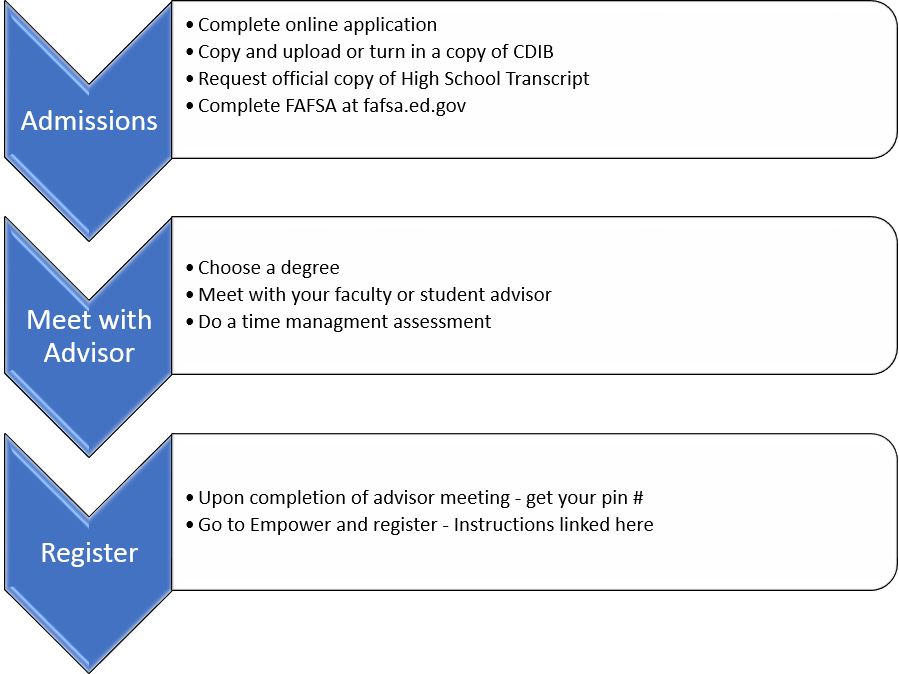Admissions
Admissions
 The Nebraska Indian Community College has an open admissions policy. Any applicant
who is able to benefit from instruction, and has earned a high school diploma or GED
certificate may apply for admission. All applicants are required to meet all the requirements
as outlined in the "Admission Procedures" section of this catalog Under the Family
Education Rights and Privacy Act of 2002, Section 507 of Public Law 107-56; as amended
April 12, 2002, students have certain rights to privacy and protection of information.
Students have the right to inspect their records upon written request, and the right
to give or withhold their written consent to the release of their educational records
under certain circumstances. The Nebraska Indian Community College does not discriminate
on the basis of race, creed, color, national or ethnic origin, sex, age, or any other
extraneous considerations. Furthermore, the College will not deny access to an otherwise
qualified applicant or student because of that applicant's or student's mental or
physical handicap. As a Tribally-chartered Indian-controlled institution, the College,
in the conduct of its employment program and some categorical grant programs, does
reserve the right to exercise Indian preference to otherwise qualified applicants
pursuant to Public Law 93-638, the Indian Self-Determination and Education Assistance
Act, and the Indian Civil Rights Act of 1968.
The Nebraska Indian Community College has an open admissions policy. Any applicant
who is able to benefit from instruction, and has earned a high school diploma or GED
certificate may apply for admission. All applicants are required to meet all the requirements
as outlined in the "Admission Procedures" section of this catalog Under the Family
Education Rights and Privacy Act of 2002, Section 507 of Public Law 107-56; as amended
April 12, 2002, students have certain rights to privacy and protection of information.
Students have the right to inspect their records upon written request, and the right
to give or withhold their written consent to the release of their educational records
under certain circumstances. The Nebraska Indian Community College does not discriminate
on the basis of race, creed, color, national or ethnic origin, sex, age, or any other
extraneous considerations. Furthermore, the College will not deny access to an otherwise
qualified applicant or student because of that applicant's or student's mental or
physical handicap. As a Tribally-chartered Indian-controlled institution, the College,
in the conduct of its employment program and some categorical grant programs, does
reserve the right to exercise Indian preference to otherwise qualified applicants
pursuant to Public Law 93-638, the Indian Self-Determination and Education Assistance
Act, and the Indian Civil Rights Act of 1968.

Persons 16 years of age or older wishing to be admitted to the Nebraska Indian Community College must complete the following:
- Submit a complete admission application (prior to enrollment).
- Submit an official high school or GED transcripts within the first term of enrollment.
*Note* If the applicant has already earned a college degree, they can submit a transcript of their highest degree earned in place of a high school or GED transcript.
If the applicant is an early college student they do not need to submit this document – see Early College Admissions.-
In order for a transcript to be official, it must be sent directly from the prior instutition. Official Transcripts must be sent directly to the Office of the Registrar digitally via. registrar@thenicc.edu or physically mailed to the address below:
Office of the Registrar
Nebraska Indian Community College
PO Box 428
Macy, NE 68039*For digital requests, you can find 'NICC' under Macy, NE.
-
- Submit a copy of tribal I.D., or parent CDIB and copy of birth certificate for dependency status if applicable within the first term of enrollment.
- Complete the FAFSA prior to receiving any financial aid beyond Institutional Waivers.
- The above admission procedures pertain to all student admissions.
Begin the process online by clicking here. The Free Application for Federal Student Aid is available at https://www.studentaid.gov.
Students who have earned college credits at another accredited institution may transfer their credits to NICC. Official transcripts must be mailed by previously attended institutions for an accurate evaluation of transfer credit. Transcripts presented directly by the student or faxed are not official and will not be used for the evaluation of transfer credit. Courses transferred into the Nebraska Indian Community College must be at the "C" level or above and within 10 years or applied to a degree. Transfer credits older than 10 years will only be accepted under a case by case special approval from the academic dean and/or department head. Consideration will be given to course work that will not jeopardize the learning of the student. Students will be notified of their academic status after the evaluation is complete. Courses that are accepted for transfer are not given a letter grade and are not calculated in the cumulative grade point average. NICC is part of the Nebraska Community Colleges TES (Transfer Evaluation System).
- High school GPA
- High school transcripts
- Years since high school graduation or GED completion
- ACT or SAT scores
- Placement Test (e.g., Accuplacer Next Generation test)
o If score below 18 on ACT, or no ACT/SAT scores available
- NURO Non-Cognitive Assessment (e.g., ETS SuccessNavigator)
- College transcript, including transfer courses (if applicable)
Currently enrolled high school students may apply for special admission for dual-credit
courses. In other words, students can earn college credit AND meet high school graduation
requirements. These dually enrolled students may enroll in no more than 6 college
level credits per term, before completion of High School requirements. Students need
to provide the following documentation:
● A complete NICC admission package is filed with the Registrar Office
● A dual credit form with required signatures filed with the Registrar Office
● Completion of placement testing meeting minimum requirements or ACT scores
High school students are not eligible for Federal financial aid. Due to the fact that all NICC sponsored dual credit systems are housed in high schools that do not have BIE funding, NICC will count dually enrolled high school students in our Form 22 for the ISC Report annually.
AUDIT A COURSE
Audit students desiring to attend a course without taking examinations or receiving credit for the
course may register under the audit classification. Students auditing courses pay
the same tuition and fees as those taking courses for credit. The audited courses
are marked “audit” at the time of registration. Students who have registered to audit
courses may not change to college credit after the last day of add/drop. Audits are
limited to two courses per academic year. Audited courses cannot be used in determining
semester course load for financial aid purposes or veteran’s benefits. Audited courses
do not affect a student’s cumulative grade point average and are ineligible for Federal
financial aid.
COURSE FOR ENRICHMENT
Enrichment Students who are taking classes for other purposes, such as to transfer to another educational
program or for their own learning will receive grades and complete work associated
with the enrolled course. The course work will not be eligible for Title IV funding
at NICC. Students enrolled at two colleges should advise the registrars and financial
aid offices of both institutions.
Students able-to-benefit from education or training offered (i.e. Nurse Aide or special
certificate programs) that have not completed the admissions requirement of High School
or general education diploma (GED) may take coursework directly related to the certificate
only. These students will not be eligible for Title IV funding.
Jeanne Clery Disclosure of Campus Security Policy and Crime Statistics Act and Campus Fire Safety Right-To-Know Act Notification
Pursuant to the Jeanne Clery Disclosure of Campus Security Policy and Campus Crime Statistics Act, the current Annual Security Report (ASR) is available for viewing: https://www.thenicc.edu/about/campus-security-report.php
The Annual Security Report contains the current security and safety-related policy statements, emergency preparedness and evacuation information, and crime prevention programming. The assault prevention information, and drug and alcohol prevention programming. The ASR also contains statistics of Clery Act crimes for Nebraska Indian Community College for the last three (3) calendar years. Paper copies are available upon request from the Financial Aid Advisor.
